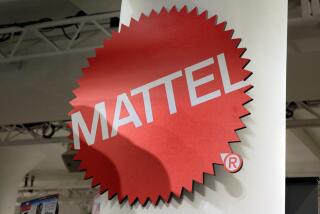Mirage Rejects MGM Grand’s Takeover Bid as Too Low
- Share via
Mirage Resorts Inc. on Tuesday rejected as too low a $3.4-billion, unsolicited takeover bid from rival gaming giant MGM Grand Inc. But Mirage left the door open to negotiate a higher offer with MGM Grand, which is controlled by billionaire Kirk Kerkorian.
To further ensure that any merger is to Mirage’s liking, Mirage adopted a so-called poison pill plan that would make any hostile attack on Mirage prohibitively expensive for the unwanted suitor.
MGM Grand, which Monday said it had arranged the necessary financing for its offer, had no immediate comment.
The response from Mirage and its chairman, Steve Wynn, was considerably less brusque than many had expected from Wynn, who built Mirage from the ground up and is now one of the most powerful executives on the Las Vegas Strip.However, Wynn has been under pressure to boost the price of Mirage’s sagging stock, which has been hurt by, among other things, Mirage’s heavy spending on its new, opulent Bellagio and Beau Rivage hotel-casinos in Las Vegas and Mississippi, respectively.
Even so, Mirage referred to MGM Grand’s offer of $17 a share in cash and stock as “an opportunistic bid which is timed to maximize values for the bidder.” The company was referring to an industrywide slump in gaming stocks recently, but especially in Mirage’s shares.
Mirage’s stock stood at a 52-week low of $10.88 a share when MGM Grand unveiled its offer last week. Mirage’s stock has moved up since then, although it closed Tuesday at $15.75 a share, down 19 cents on the day. MGM Grand’s stock slipped 31 cents to close at $19.88 a share. Both trade on the New York Stock Exchange.
Mirage said its board “would be willing to consider a transaction which would fairly reflect the long-term values inherent in the Mirage properties, brand name and good will,” but it didn’t specify a particular price it might accept. Less than a year ago, Mirage’s stock traded above $25 a share.
Mirage’s adoption of the poison pill wasn’t surprising, because it’s legal advisor is Wachtell, Lipton, Rosen & Katz, which invented the anti-takeover device during the merger-mania 1980s.
Should an unwelcome bidder acquire or launch a tender offer to acquire 10% or more of Mirage’s stock, the pill would kick in. Its rights effectively would enable existing Mirage investors to buy Mirage’s stock for a fraction of its current value, which would flood the market with additional shares and make it extremely costly for the bidder to carry out a takeover.
The rights “are designed to assure that all of Mirage Resorts’ stockholders receive fair and equal treatment in the event of any proposed takeover,” Wynn said in a statement. Wynn himself owns nearly 24 million shares, or nearly 12%, of Mirage’s stock.
More to Read
Inside the business of entertainment
The Wide Shot brings you news, analysis and insights on everything from streaming wars to production — and what it all means for the future.
You may occasionally receive promotional content from the Los Angeles Times.











